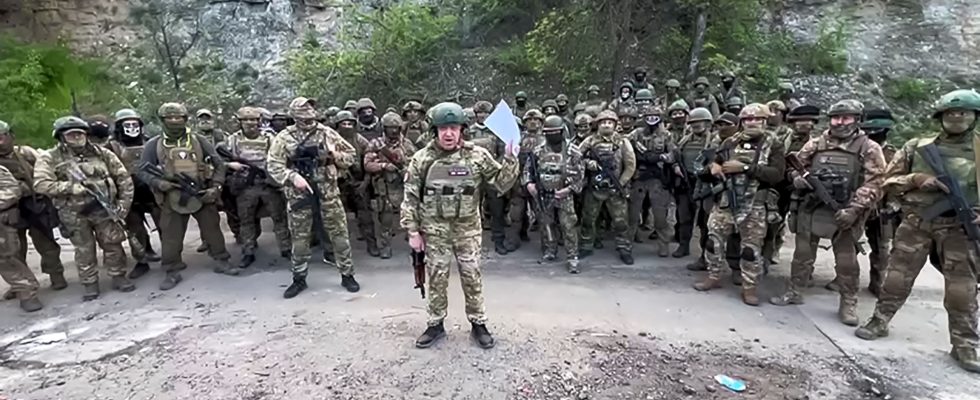The National Assembly adopted, this Tuesday, May 9, unanimously a resolution asking to register the Russian paramilitary group Wagner, accused of abuses in Ukraine and Africa, on the list of the European Union of terrorist organizations. The text, without binding value, invites the French government “to mobilize diplomatically” so that Brussels accedes to this request, which should make it possible to sanction more effectively the members of Wagner and their supporters, in particular financially.
Led by Renaissance MP Benjamin Haddad, the resolution was co-signed by deputies from the various majority groups, but also by elected officials from the socialist, environmentalist and LR ranks. In question: the “numerous abuses against the civilian population” in Ukraine committed by this group of mercenaries, some of which could be qualified as “war crimes”. “The activity of the Wagner group meets the European definition of terrorism”, pleaded in the hemicycle Benjamin Haddad, describing an “army of chaos” standing “alongside Putin’s Russia”, and whose members “sow instability and violence”.
The text quotes in particular the German intelligence services, according to which Wagner “took part in the summary executions, the mutilations and the acts of torture committed against civilians in the Ukrainian locality of Boutcha”. In addition to Ukraine, the resolution also notes abuses in Syria and in several African countries such as Mali or the Central African Republic.
A resolution that is not binding
More concretely, what will be the scope of this resolution? As pointed out National Assembly website, the resolution is an “act by which the Assembly expresses an opinion on a specific question”. Before 1958, they were a traditional technique of expression of the Parliament and their adoption could lead to the questioning of the responsibility of the Government. “This practice was banned by the Constitution of the Fifth Republic in the name of rationalized parliamentarism”, continues the site. Thus, these resolutions do not “in law have the general character of a law”.
The head of French diplomacy, Catherine Colonna, welcomed the resolution of the deputies in the hemicycle, after having listed the numerous abuses attributed to the Wagner group and cited the sanctions already taken by the EU. By the end of 2021, Brussels had already put in place a series of measures against the organization and against eight people and three entities with links to the paramilitaries. This resolution therefore aims to go further in this direction. “From a strictly legal point of view”, the terrorist qualification of the group by the EU would have “no direct additional effect”, said Catherine Colonna. But “we must not underestimate the symbolic importance of such a designation, nor the dissuasive character that it could have vis-à-vis the States which would be tempted by an appeal” to Wagner, she said. estimated.
This decision could therefore serve as a new step to initiate more formal negotiations at European level. Since the attacks of September 11, 2001, in the context of the fight against terrorism, Brussels has drawn up a list of persons, groups and entities involved in acts of terrorism and subject to restrictive measures. A total of thirteen individuals and 21 groups and entities appear on this list. It should be noted that the European Council reviews this catalog at regular intervals and at least every six months. In addition to this review, the institution may, at any time, adopt a decision concerning the registration or deregistration of persons, groups or entities.
A similar resolution already adopted by Lithuania
“The ‘Restrictive Measures to Combat Terrorism’ group (‘COMET’ group) examines and assesses the information with a view to listing or delisting”, continues the website of the European Council. What is the instruction ? COMET recommendations are addressed to the European Council before being adopted. Amendments are published in the Official Journal. Among the sanctions that could target the members and supporters of this private military entity: freezing of its assets, limitation of international travel or even severe repression of their actions. For example, companies that may do business with the Russian militia could be sanctioned.
In November 2022, the European Parliament called Russia a “State promoter of terrorism”. MEPs had called on the EU and member states to put in place a “European legal framework”. In mid-March, the Lithuanian Parliament has already adopted a resolution affirming that “Wagner is a terrorist organization”, arousing the thanks of kyiv. In the United Kingdom, Parliament has conducted an inquiry and has yet to decide.
Another resolution relating to the conflict in Ukraine could soon be examined in session. Supported by Renaissance MP Pieyre-Alexandre Anglade, it aims to denounce the deportations of Ukrainian children by Russia, in a “deliberate strategy of destruction of the national identity and Ukrainian society”. For his part, Ukrainian President Volodymyr Zelensky welcomed the initiative, saying that “this is what the whole world must adopt”. “Any manifestation of terrorism must be eliminated and every terrorist must be condemned,” he said in his evening address.
